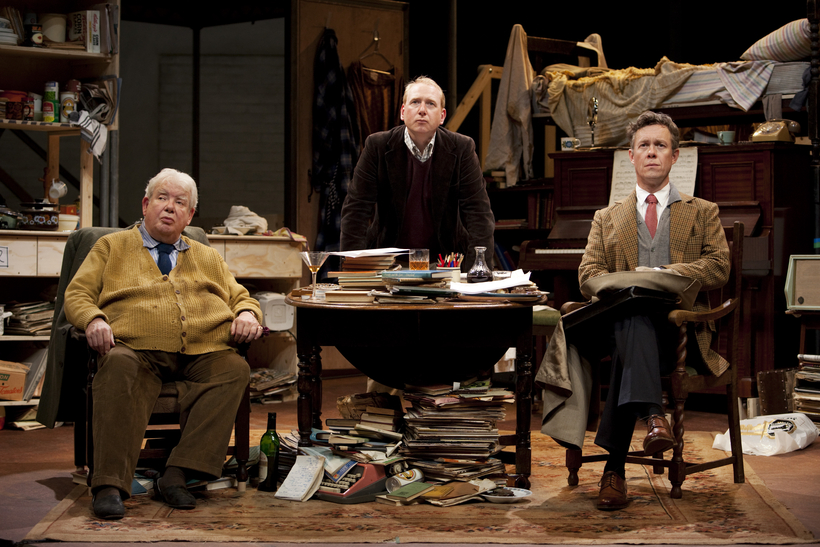Alan Bennett’s comedy The Habit of Art unfolds in a studio in the bowels of the National Theatre in London. A script-in-progress is having its first run-through. The subject: a reunion, late in their lives, of the poet W. H. Auden and the composer Benjamin Britten, revered gay artists dealing with the homophobia of their age in antithetical ways. Premiered in the fall of 2009 at the National Theatre (where else?!), this Chinese box of a play has yet to cross over to the Big Apple. Happily, there’s a live video of the original production.
Between television (Talking Heads), movies (The Madness of King George, The Lady In the Van), and the printed word (The Uncommon Reader, The Clothes They Stood Up In), Americans have had exposure galore to Bennett’s sprawling, acerbic oeuvre. Yet his Broadway credits have been few and wildly uneven.
In 1962, two years ahead of the Beatles, Bennett breezed into Manhattan with the review Beyond the Fringe, co-scripted and co-performed by his fellow Oxford brainiacs Peter Cook, Jonathan Miller, and Dudley Moore. The foursome’s razor-sharp writing and acting skills won them a collective Special Tony Award “for their brilliance which has shattered all the old concepts of comedy.” All the old concepts! Imagine!
In 1975, Bennett was back, flying solo as the playwright of the medical farce Habeas Corpus. The New York Times was not amused. “In the theater it is not merely a question of a rose always being a rose,” wrote the ever-quotable Clive Barnes, having despised the play before in London. “Regrettably a lemon is always a lemon.” Not for another 30 years would Broadway finally place a third bet on Bennett. The play was his far-from-Hogwarts educational drama The History Boys, winner in 2006 of six Tony Awards, including Best Play.

The Habit of Art was Bennett’s next act, and it’s a lulu. The play-within-the-play, called Caliban’s Day, revolves around Auden, gasbag in residence at Christ Church, Oxford, surprised early on by a BBC interviewer he mistakes at first for a tardy rent boy. Enter, eventually, the prim, uptight Britten, who has spent a lifetime mostly sublimating appetites the Falstaffian Auden indulges without a second thought. (His locker-room talk is blunt, crude, and totally joyless.) Britten is on eggshells over Death In Venice, his as yet unfinished final opera, after Thomas Mann’s homoerotic novella. In surrealistic interludes, a chair, a clock, even a crease in Auden’s craggy face come to life to jabber about him in indiscreet, Audenesque verse.
The frame play, The Habit of Art, revolves around the practicalities of getting Caliban’s Day off the ground. The almighty director, inconveniently, is otherwise engaged. The touchy playwright, inconveniently, has dropped in unannounced. Two cast members, inconveniently, are appearing in the Chekhov matinée. A sulky actor wants a cut speech back. Another has an idea! New pages? Oh no!
Within the stellar ensemble, Richard Griffiths shines as Fitz, the old crank who plays Auden, momentarily in a hot rubber mask, with Alex Jennings his perfect foil as Henry, the still water who plays Britten. Best of all is Frances de la Tour as Kay, the stage manager and de facto Prospero of this South Bank Tempest, herding the cats with Circean diplomacy. And it’s Kay, at the 11th hour, who decodes the play’s title in a panegyric to the theater, distilled from the experience of a lifetime.
The Habit of Art streams on the National Theatre At Home Web site
Matthew Gurewitsch writes about opera and classical music for AIR MAIL. He lives in Hawaii

